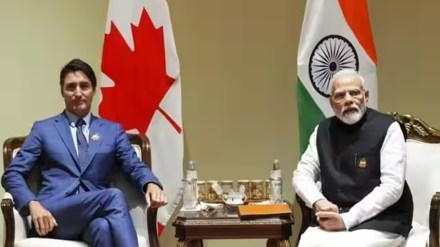India has asked Canada to reduce its diplomatic presence in India due to what it calls “interference” by Canadian diplomats in Indian matters. This comes after Canadian Prime Minister Justin Trudeau made allegations concerning the killing of a Khalistani terrorist.
Earlier today, India suspended visa services for Canada, potentially affecting many people planning to travel to India.
“The number of Canadian diplomats in India is higher than Indian diplomats in Canada, so we’ve told Canada to reduce their presence,” said Arindam Bagchi, official spokesperson of the Ministry of External Affairs. “Their numbers here are much higher than ours in Canada, so we expect a reduction.”
The dispute began when Justin Trudeau accused Indian agents of involvement in the murder of Khalistani terrorist Hardeep Singh Nijjar near Vancouver in June. India has dismissed these allegations as baseless.
This controversy led to diplomatic expulsions between the two countries.
Regarding the suspension of visa services for Canadians, the foreign ministry cited “security threats” that were affecting their officials’ work. The spokesperson explained, “Due to the security situation in Canada and the lack of action by the Canadian government, we have temporarily suspended visa services.”
This suspension followed the foreign ministry’s concern for the safety of Indian citizens in Canada, citing “politically-condoned hate crimes and criminal violence.” They noted that Indian diplomats and some members of the Indian community opposing anti-India agendas had been targeted.
Canada’s High Commission in India had previously announced plans to “adjust” its diplomatic staff numbers in response to threats against their staff on social media. They stated, “Given the current tense situation, we are taking steps to ensure the safety of our diplomats and have decided to temporarily reduce our staff presence in India.”
Hardeep Singh Nijjar was killed by masked gunmen outside a Gurdwara in Surrey on June 18. He was known for supporting Khalistan. India has firmly denied Trudeau‘s allegations, stating that no specific evidence was provided.
Responding to another query at the weekly briefing Bagchi said: “We are open to reviewing any specific information provided, but thus far, Canada has not shared any details with us.”
Adding, “We have shared specific evidence of criminal activities by individuals on Canadian soil with Canada, but no action has been taken. It seems these allegations by the Canadian government are primarily politically motivated.”
He also confirmed that Trudeau had raised these allegations with Prime Minister Modi during his visit to India for the G20 summit, and Modi had rejected them. The MEA also accused Canada of being a safe haven for terrorist activities, claiming that they had provided Canada with a list of 20-25 names of individuals involved in such activities over the years, but no action had been taken.
India-Canada Diplomatic Relations: A Recent Timeline
On Monday, Trudeau claimed that India had a hand in the killing of Sikh separatist leader Hardeep Singh Nijjar, who had been wanted in India for years and was killed in June. Trudeau stated that he had credible evidence of Indian involvement.
New Delhi denied the accusation, leading to a diplomatic back-and-forth between the historically friendly nations of India and Canada. Both countries decided to expel one diplomat each from their respective consulates.
India issued a warning to its citizens residing in Canada, advising them to exercise the utmost caution.
India temporarily halted its visa processing services in Canada, which also affected Canadian residents in other countries.
India requested that Canada reduce its diplomatic presence in India, citing allegations of interference in India’s internal affairs.
